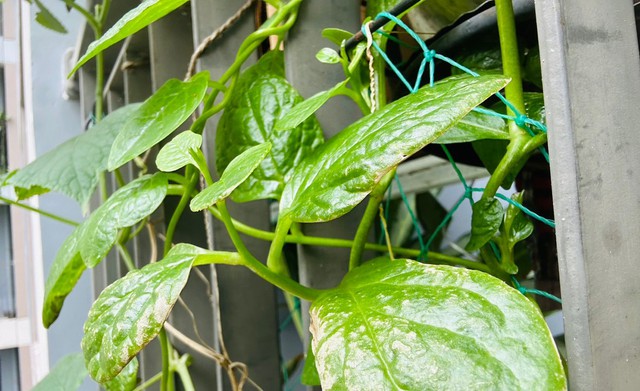Specialist Doctor 2 Huynh Tan Vu, lecturer of Traditional Medicine Department, University of Medicine and Pharmacy, Ho Chi Minh City, said: Malabar spinach has the scientific name Basella alba L and belongs to the family of malabar spinach - Basellaceae. This is a climbing herb with alternate leaves, intact and succulent blades. In our country, Malabar spinach is a very popular vegetable, can be processed into many delicious soups, is a useful medicine with many health benefits.
According to traditional medicine, Malabar spinach has a sweet, sour taste, cold properties, and has the effect of clearing heat, improving bowel movements, cooling blood, and detoxifying. This plant is often used to treat constipation, difficult urination, bloody diarrhea, skin rashes, and acne.
According to modern medicine, fresh Malabar spinach leaves contain many vitamins, mainly vitamins A and B; the plant contains protein, calcium, iron, vitamins, and mucus. In addition, Malabar spinach leaves contain many compounds such as ß-carotene, lutein, and zeaxanthin, which help protect the body from free radicals that are associated with aging and various disease processes.
The stems and leaves of Malabar spinach also contain many non-starch polysaccharides, mucus, and fiber to aid digestion. Fiber helps reduce cholesterol absorption and prevent intestinal problems.

Malabar spinach is a climbing herb with alternate leaves, intact and succulent blades.
LE CAM
Doctor Vu shares some folk remedies using Malabar spinach:
Good for bones and joints : The juice from Malabar spinach can help heal burns quickly. Stewing Malabar spinach with pig's feet and adding a little wine to eat every day will help treat bone and joint pain.
Constipation : Use 500g of Malabar spinach, add fish sauce, salt, soy sauce, vinegar, cook into a soup to eat with meals; after a few days, bowel movements will be smooth.
Chronic bloody stools : 30g Malabar spinach, 1 old hen (remove head, feet, organs), stew and eat; after the chicken is cooked, add Malabar spinach, cook for another 20 minutes.
Cooling, detoxifying, and curing constipation : Malabar spinach is cooked into soup and eaten daily. Use it for a few days and your bowel movements will be smooth and you will no longer be constipated. Pregnant women who often suffer from constipation can use Malabar spinach instead of harmful laxatives. It promotes digestion by adding mucus and soluble fiber, making it easier for pregnant women to defecate.
Difficulty urinating, painful urination, dribbling: Use 70-100g fresh Malabar spinach, boil in water and drink instead of tea during the day.
Nosebleed due to blood heat : Use fresh crushed Malabar spinach, use cotton to absorb the juice, and stuff into the nostrils.
Beautiful skin : Take young Malabar spinach leaves at the tip of the branch, crush to get the juice, add a little salt, apply several times then wash clean. Do this every night before going to bed.
Treatment of difficult urination : Crush or grind Malabar spinach leaves, squeeze out the juice and mix with boiled water to cool, add a little salt. Drink this mixture in the morning before breakfast, and use the Malabar spinach residue to apply on the lower abdomen where the bladder is.
Milk booster : Women who have little milk after giving birth should eat Malabar spinach to produce more milk. Stew the chicken with black beans, then add Malabar spinach and cook for another 5 minutes. Feed the mother while it is still hot to help stimulate milk production. This dish also contains a lot of iron, vitamins and mucus to help prevent postpartum constipation and improve health, nourish the skin and reduce hair loss.
However, Dr. Vu also noted that Malabar spinach is cold in nature, so people with weak spleen and stomach should not eat much. Medicinal dishes made from Malabar spinach should be eaten within the day after being prepared. Each time you eat, you should reheat it. Avoid leaving Malabar spinach overnight, which can cause deterioration and poisoning.
Source: https://thanhnien.vn/mon-ngon-vi-thuoc-rau-mong-toi-thanh-nhiet-giai-doc-185230721103549057.htm




















































![[Maritime News] More than 80% of global container shipping capacity is in the hands of MSC and major shipping alliances](https://vphoto.vietnam.vn/thumb/402x226/vietnam/resource/IMAGE/2025/7/16/6b4d586c984b4cbf8c5680352b9eaeb0)













































Comment (0)